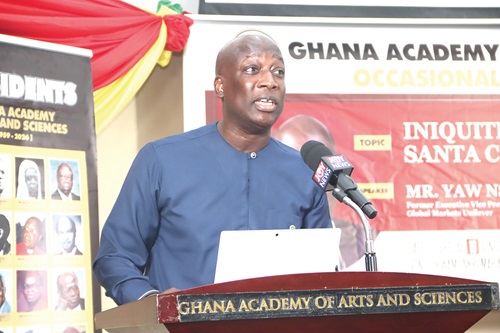A business executive and international speaker, Yaw Nsarkoh, has cautioned against the overreliance on privatisation as a tool for national development, saying it could not substitute the urgent need for a competent and visionary state.
He said that was because over-dependence on the private sector in shaping the governance and development agenda risked deepening inequality, entrenching elite privilege and sidelining the needs of the majority, particularly since a large proportion of the population was deemed multidimensionally poor.
“At this stage of our development, it is simply not tenable to leave the engine of growth in the hands of the private sector alone,” he asserted, arguing that inclusive growth and democratic development required cross-sectoral approaches led by a competent state.
Mr Nsarkoh, who is a former Executive Vice-President of Global Markets at Unilever, made the remarks in a lecture he delivered at the Ghana Academy of Arts and Sciences (GAAS) last Thursday evening.
Lecture
The lecture, which was on the theme: "Iniquities of Inequity in Our Santa Claus Democracy”, explored how democracy, stripped of substance and driven by transactional politics had deepened inequality.
![]()
Through five sub-themes, namely inclusive development, the role of elites, traditional authority, political parties, and the media, Mr Nsarkoh examined how gift-giving and short-term political culture, which he referred to as “Santa Claus Democracy”, had eroded civic agency and institutional integrity across the country and much of Africa.
The lecture was attended by fellows of the academy, other leading academics, professionals, policy analysts and students from the Labone Senior High School (SHS), among others.
Competent state
Mr Nsarkoh stated that privatisation must be based on a competent, transparent, innovative, human-centred state capable of steering society towards inclusive development through strategic and long-term policy choices and not blind ideology.
“Privatisation is not a bad thing when done on the basis of credible long-term economic modelling. But when pursued blindly as an ideological article of faith, it often leads to state capture by oligarchs and cronies of the powerful,” he said.
Mr Nsarkoh further emphasised that the private sector would thrive only within a well-governed system that invested in knowledge, ensured fair wealth distribution, and prioritised people-based development.
“The principle should be clear by now; Stable societies focus on improving the livelihoods of all.
Santa Claus democracies deliver for only a predatory and parasitic elite.
The inputs used by the private sector in a country like ours are often the product of the back-breaking work of peasants.
Our demographic reality today is such that the majority of citizens are peasants.
Our development policies cannot miss this and thrive,” he said.
He also called for reforms to insulate key appointments from political interference, arguing that sustainable development demanded credible long-term planning, land reform, and transparent campaign financing.
Party failure, intellectuals
Mr Nsarkoh critiqued the country’s dominant political parties as vehicles of transactional politics rather than true democratic representation.
He argued that both the New Patriotic Party (NPP) and the National Democratic Congress (NDC) had failed to build people-centred institutions, instead acting as electoral machines sustained by opaque campaign financing and patronage.
He warned that their selective condemnation of coups — seemingly opposing them only when in power — reflected a dangerous lack of conviction in democracy itself.
Calling for radical reform, he advocated that political parties should be rooted in learning, civic consciousness and accountability, without which “Santa Claus Democracy” would become vulnerable to manipulation, division and systemic collapse.
To help the situation, Mr Nsarkoh emphasised that the highly educated—intellectuals, professionals and scholars—had a crucial responsibility in confronting the systemic inequities of the “Santa Claus Democracy”.
He argued that without active civic engagement from intellectuals, democracy risked being hollowed out by anti-intellectualism, policy incoherence and elite capture.
Mr Nsarkoh urged the educated class to resist retreating into silence or irrelevance, instead championing a culture of meritocracy, critical thought and continuous learning. Drawing on examples from China, Amartya Sen, and African thinkers, he stressed that true development demands knowledge-driven leadership committed to justice, equity and structural reform—not applause for mediocrity or opportunism.
The former Unilever Executive touched on the role of chiefs and traditional leaders within the country’s democracy, emphasising the urgent need for reform and calling for a national, constitutional conversation on chieftaincy’s future.
While acknowledging their potential for constructive national development, he warned against romanticising chieftaincy as an untouchable cultural institution.
Mr Nsarkoh highlighted issues like rampant chieftaincy disputes, illegal mining, and questionable cultural practices that reflected a system increasingly misaligned with democratic aspirations.
He urged traditional leaders to embrace modernisation and accountability, asserting that those who seek power must also accept responsibility.
Mr Nsarkoh expressed deep concern about the deteriorating state of the media in the “Santa Claus Democracy” highlighting its critical role in shaping societal behaviour.
He lamented the rise of unprofessionalism, unethical conduct and hyper-fragmentation, which had led to a toxic media landscape dominated by partisan shouting, abuse and misinformation.
He said with over 700 stations, many lacking resources for quality journalism, the media space had been hijacked for political agendas.
Mr Nsarkoh criticised regulatory failure and called for constitutional clarity and empowerment of the National Media Commission (NMC). He urged responsible reform to restore professionalism and truth, warning that national development would suffer without credible media.

